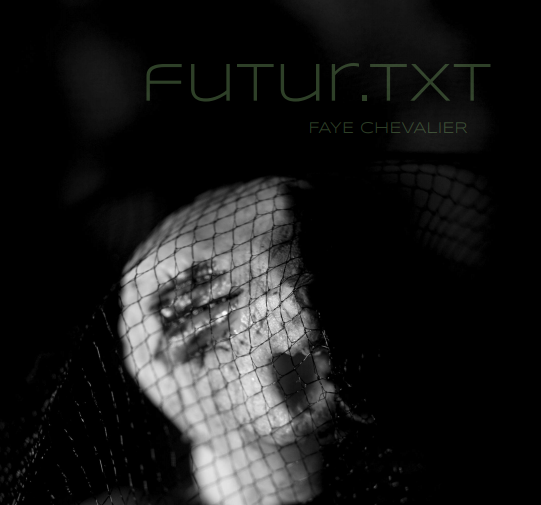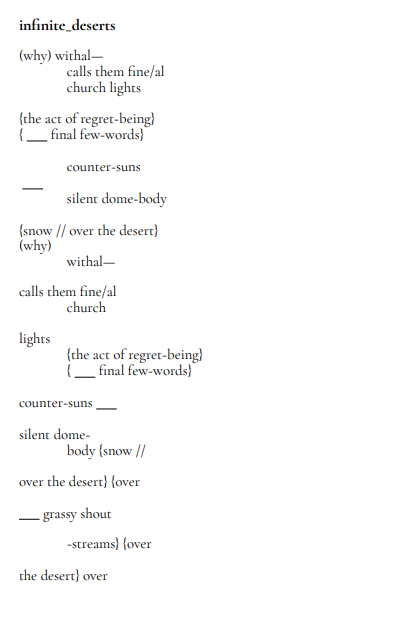BY JOANNA C. VALENTE
Poetry in the age of the internet is the kind of poetry I want to read. Faye Chevalier, Philadelphia-based poet, has a chapbook imminently forthcoming from Empty Set Press. It's called FUTUR.TXT.
It's a collection that uses language in the way we use it now with email and text messages and instant gratification: Sometimes the language is excessive, sometimes we see spaces and lines where words should be, sometimes we need to read through the lines. More than ever, humans read between texts and sexts. Chevalier immediately sets the tone within the second poem: "this partition, a satellite-d sex-bot, an as-a-Marisol’s-guardian-angel, her heaven now-clothed in photograph" (5). In "infinite_deserts," Chevalier mimics how we save files to computers with the title, as if reminding us that computers are just infinite wastelands of whatever we allow it to be, of whatever we create - which means it's both terrifying and gorgeous:
In many ways, this landscape is unknowable. The body in this poem is also unknowable. Do we actually know ourselves in this new technological, selfie-obsessed landscape? In a time where we see our image over and over again, every day, does the image become diluted of itself? Chevalier has some answers for us: "the she-machine, a closing-through (bright mirrors and jest-lights)" (10). In another poem, Chevalier writes how iPhone's have changed how we interact not just with others, but ourselves: "an iPhone app tht will send/you a push notification if i starve myself/ (again) so you can come & find me/so you can break my teeth in—" (18).
What is the self if it's just a copy of a self we have already copied? I couldn't help, as the reader, think of this question continually as I read the poems. The self-awareness about the game of it, the game of persona, is seen: "i tweet “get drunk / go to bed / wake up / read a bunch of ‘i love you, it looks like rain’ / go to bed / wake up / read a bunch of 18 ‘i love you, it looks like ra[in’]”;" (19).
The poem "sext" exemplifies the disconnect between the body happening in the collection, and with technology in our daily lives. There are often missed words and violence and decay happening in the poem (rotten eggplants, knuckles), showcasing a sexual experience that isn't comfortable, that doesn't connect the mind and body together the way sex is meant to. The space here is not safe; it is traumatic. In a time where space isn't just tangible, but now intangible, the reader is forced to think about spaces and how we can create safe ones in an intangible realm.
I definitely recommend this collection for anyone who wants to think about human relationships in the digital realm, who want to be more present, who want to think about ways to create safe spaces, who want to be human.
Joanna C. Valente is a human who lives in Brooklyn, New York. They are the author of Sirs & Madams (Aldrich Press, 2014),The Gods Are Dead (Deadly Chaps Press, 2015), Marys of the Sea (Operating System, 2017), Sexting Ghosts (Unknown Press, 2018), Xenos (Agape Editions, 2016), and the editor of A Shadow Map: Writing by Survivors of Sexual Assault (CCM, 2017). They received their MFA in writing at Sarah Lawrence College. Joanna is the founder of Yes Poetry and the managing editor for Luna Luna Magazine. Some of their writing has appeared in Brooklyn Magazine, Prelude, BUST, Spork Press, and elsewhere. Joanna also leads workshops at Brooklyn Poets. joannavalente.com / Twitter: @joannasaid / IG: joannacvalente
































